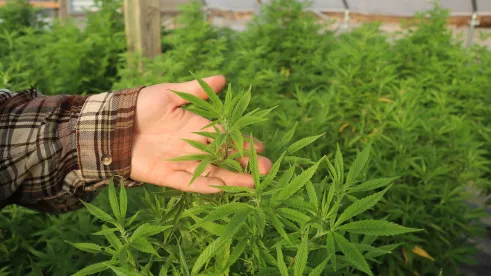On Nov. 26, 2019 Governor Evers signed into law 2019 Wisconsin Act 68, taking the next step in Wisconsin’s transition from the industrial hemp pilot program to the permanent regulatory structure authorized by the 2018 Farm Bill.
The new law, dubbed the Growing Opportunities Act, was approved by the Wisconsin Legislature with near-unanimous support and provides some additional certainty under state law regarding the processing and marketing of hemp and hemp products, including cannabidiol (CBD). However, a fair amount of uncertainty remains as additional pieces of the regulatory puzzle must fall into place.
State Hemp Regulation Continues To Develop
Act 68 provides industry stakeholders with additional clarity under state law regarding several key aspects of Wisconsin’s growing hemp economy.
Highlights of the new law include:
-
Sunsetting the pilot program and directing DATCP to apply to USDA for approval of hemp regulatory plan – Act 68 makes clear the Department of Agriculture, Trade & Consumer Protection (DATCP) will apply to the U.S. Department of Agriculture (USDA) to become the primary regulator for hemp grown in Wisconsin, as allowed under the 2018 federal Farm Bill. The legislation repeals the pilot program one year after the USDA establishes its hemp production regulatory plan, effectively making 2020 the last year of the pilot program. The regulation of hemp cultivation in subsequent years will be established in the state’s regulatory plan approved by the USDA.
-
Possible licensing changes – Whether and how actors in the hemp economy other than growers will be licensed in the future is an open question. Under the pilot program, both producer and processor licenses are mandatory. Act 68 requires those producing hemp to be licensed if the federal law requires such a license. The law also allows the department to issue additional licenses for sampling, testing, processing, transporting and selling hemp, but doesn’t necessarily require it.
-
Product “Truth-in-Labeling” – The act prohibits knowingly making an inaccurate claim about the content, quality or origin of hemp or a hemp product, and prohibits knowingly selling mislabeled hemp or hemp products.
-
Retail products “safe harbor” – Creates a new safe harbor from prosecution for possessing cannabis with an excessive THC concentration that was certified or approved by DATCP, if the person possessing the “hot” hemp has no reason to believe that the certification is incorrect.
-
Processing “safe harbor” – The act provides protection under state law when, during the processing of hemp, THC concentrations exceed the legal limit temporarily, so long as the cannabis is reconditioned to meet the permissible THC concentration limit.
-
Grower contracts and land ownership restrictions – The act creates a private cause of action for grower contracts, requiring payment to be made within seven days of taking possession of the hemp, unless otherwise agreed to by the grower. The new law also extends the prohibition on certain corporations or trusts from owning land used for farming operations to include hemp cultivation.
-
Limited exemption for THC as a restricted controlled substance – Recognizing that legal CBD usage may result in the presence of minimal amounts of THC in a person’s blood, the Act requires that to qualify as “restricted controlled substance” the THC concentration must exceed 1 ng/mL.
What will Wisconsin's USDA application look like?
The act positions DATCP to apply to the USDA to become the primary regulatory for hemp grown in Wisconsin. But the future of hemp cultivation in Wisconsin will be driven in large part by USDA rules. In many instances, these rules are more stringent than what is allowed under Act 68, especially as it relates to testing for THC content.
As Wisconsin develops its application for primary regulator status, stakeholders should watch closely to see whether flexibilities under state law are incorporated into the state’s application to the USDA.
What’s next?
As the state and federal regulation of hemp and CBD continues to develop, the opportunities and risks for businesses in this growing, legal market are becoming clearer. Stakeholders should watch closely as DATCP develops its regulatory plan for USDA approval and promulgates administrative rules to further implement Act 68.



 />i
/>i

